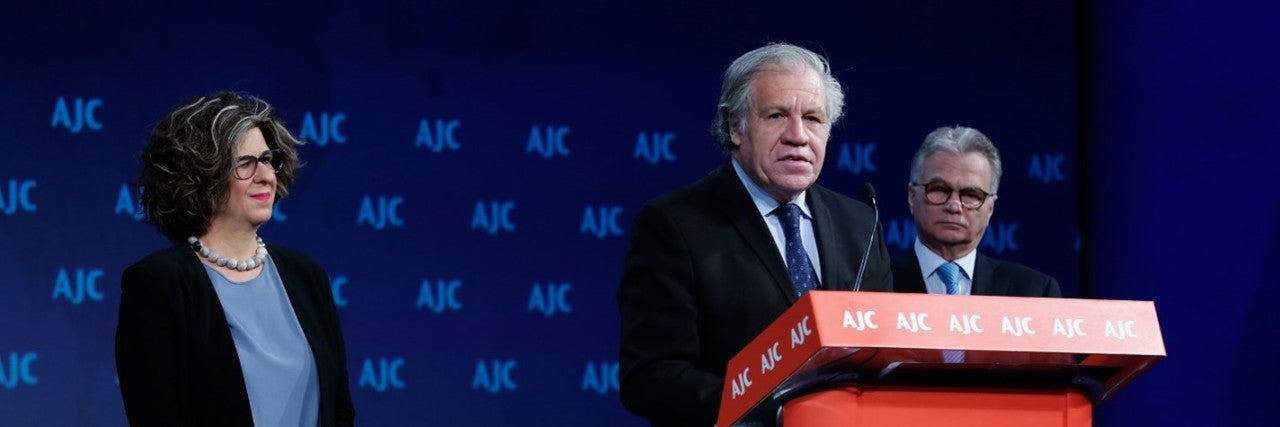June 3, 2022
Dozens of groundbreaking initiatives have been unveiled by American Jewish Committee (AJC) on the AJC Global Forum stage over the years. Here are five initiatives spotlighted during the premier Jewish advocacy event, which set the stage for making a difference and yielded lasting change.
- Launch of the Congressional Caucus on Black-Jewish Relations
At AJC Global Forum 2019, U.S. Representatives Brenda Lawrence (D-MI), Lee Zeldin (R-NY), and Debbie Wasserman Schultz (D-FL) announced the launch of the bipartisan Congressional Caucus on Black-Jewish Relations, convened by AJC.
The caucus aims to raise awareness of each community’s sensitivities and needs in Congress and around the country and to provide resources to members of Congress to empower them to bring Black and Jewish communities together, find mutual interests, and combat stereotypes and hate. Additional founding co-chairs were former Representatives Will Hurd (R-TX) and the late John Lewis (D-GA).
In May 2020, the caucus backed the Jabara-Heyer NO HATE Act, which passed a year later. “Hate crimes will continue to spread if left unaddressed. For our country to thrive during this turbulent time, each of our communities must not only feel safe but know that their concerns are counted on a national scale.” Days later, George Floyd was murdered and the caucus convened a roundtable of a select group of Black and Jewish organizations, including AJC, to discuss policy recommendations to combat racism in the U.S.
The House Caucus also inspired U.S. senators to follow suit. At Global Forum 2021, U.S. Senators Cory Booker (D-NJ), Jacky Rosen (D-NV), and Tim Scott (R-SC) announced the launch of a bipartisan Black-Jewish Senate Caucus, convened by AJC.
“The sheer presence of caucuses bringing Blacks and Jews together in the House and the Senate is an inestimable achievement,” said Julie Fishman Rayman, AJC Senior Director of Policy and Political Affairs. “During a time of polarization and divisiveness, that they are able to issue joint statements—from Blacks and Jews, Republicans and Democrats—in response to racist or antisemitic incidents is a model for what American civil discourse should be.”
- Austria Aligns National Security with Israel
At AJC Global Forum 2018 in Jerusalem, then-Austrian Federal Chancellor Sebastian Kurz declared for the first time in his country’s history, that his government viewed Israel’s national security as part of his country’s Staatsräson, or national interest. Not until 1991 had Austria acknowledged its own central role in the Holocaust.
In 2019, AJC CEO David Harris accepted Austrian citizenship in honor and memory of his father, who had been denied that citizenship as a Jew in Vienna in the 1930s.
Sadly, the Alpine nation saw a record number of antisemitic incidents last year. But the government has been quick to address it, already initiating several projects to combat the scourge. It also has established a grant of more than $700,000 for the security of the Jewish community.
Additionally, as part of these efforts to combat Jew-hatred, the government passed a national antisemitism strategy earlier this year, which proposed several measures, including the establishment of a Center for Antisemitism Research. Austria adopted the IHRA Working Definition of Antisemitism in 2017.
- Organization of American States Establishes Antisemitism Monitor
At AJC Virtual Global Forum 2021, attendees witnessed history when Luis Almagro, Secretary-General of the Organization of American States (OAS), announced he would establish the position of OAS’ Commissioner to Monitor and Combat Antisemitism
Three months later, he fulfilled that promise, appointing Fernando Lottenberg, a renowned Brazilian constitutional lawyer to the post.
At the 2019 AJC Global Forum, Almagro also made the announcement that the OAS would adopt the IHRA working definition of antisemitism.
Lottenberg has been president of the Confederation of Jewish Communities of Brazil (CONIB) and is currently a member of the Board of Trustees of the Institute of Latin American and Latino Affairs of AJC.
In early June, with the support of Almagro and OAS, Colombian President Ivan Duque adopted the IHRA working definition of antisemitism.
- Muslim World League Announces Historic Visit to Auschwitz
In January 2020, the head of the Muslim World League (MWL), Mohammed Al-Issa, and a delegation of prominent Muslim religious leaders, joined AJC on a landmark interfaith tour of the former Nazi extermination camps of Auschwitz-Birkenau. Five months later, at AJC Global Forum 2020, Al-Issa shared what the historic visit meant to him and discussed the future of Muslim-Jewish relations.
That relationship has only continued to flourish.
Last month, Rabbi David Rosen, AJC’s International Director of Interreligious Affairs, represented AJC at the first-ever multi-faith conference held in the Kingdom of Saudi Arabia and hosted by the MWL.
“That such a multi-faith conference is hosted by Saudi Arabia, which has seen itself as a kind of Muslim Vatican and which until recently viewed any presence of other religions to be undesirable, is truly a sign of new times,” Rosen said.
Before that, AJC’s Director of Muslim-Jewish Relations Ari Gordon spoke at two conferences that hosted Al-Issa – one online, the other at an evangelical megachurch – to highlight MWL’s vision for engagement with and openness to other cultures, religions, and states.
- UN Official Pledges Action Plan to Combat Antisemitism
Two years after he released a historic 2019 report on global antisemitism as a human rights concern, Dr. Ahmed Shaheed, the United Nations Special Rapporteur on Freedom of Religion or Belief, promised participants at AJC Global Forum 2021 that he would not just sit on the report’s troubling findings. He pledged to develop an action plan to combat antisemitism before the end of his mandate in 2022.
In May 2022, Shaheed fulfilled his promise, publishing an action plan to combat antisemitism that calls on governments to consistently condemn antisemitic incidents; strengthen their efforts to educate officials and all of society about antisemitism; step up their efforts to monitor, record, and publish data on antisemitic hate crimes and incidents; and use the IHRA Working Definition of Antisemitism as a critical source informing these efforts. The plan also urges social media companies to take a range of actions to prohibit and remove antisemitic content as well as Holocaust distortion and denial on their platforms.
The action plan draws from a consultation of experts, officials and representatives of Jewish communities and watchdog organizations convened in November 2021 by AJC’s Jacob Blaustein Institute for the Advancement of Human Rights. Shaheed’s original report on antisemitism drew from similarly private consultations convened during AJC Global Forum 2019.
Shaheed, who hails from the predominantly Muslim South Asian islands of the Maldives, calls on every government, including those in countries where no Jewish communities reside to adopt a national action plan to combat antisemitism.

